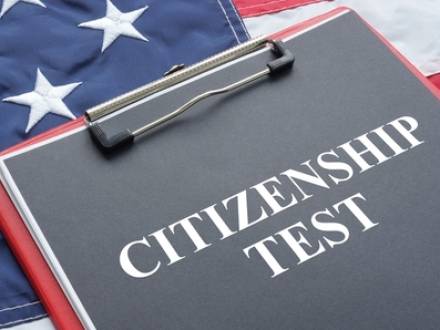USCIS Tightens the Citizenship Test: What the New Rules Mean
 If you are planning on applying for U.S. citizenship in the near future, you should know about a major change under U.S. Citizenship and Immigration Services (USCIS) as directed by the current administration. The civics test (known as the naturalization test) will become more difficult as of October 20th, 2025. Applicants will be required to answer more questions from more areas, and a higher number of correct answers will be required to pass the test.
If you are planning on applying for U.S. citizenship in the near future, you should know about a major change under U.S. Citizenship and Immigration Services (USCIS) as directed by the current administration. The civics test (known as the naturalization test) will become more difficult as of October 20th, 2025. Applicants will be required to answer more questions from more areas, and a higher number of correct answers will be required to pass the test.
The changes will restore a more difficult version of the 2020 test, while also creating new challenges. In particular, non-citizen immigrants who have limited resources to prepare for the test and speak English as a second language could find the new test problematic. More information about the new test can be found below. It can also be beneficial to speak to an experienced Bloomingdale, IL family immigration attorney who can answer any questions you may have.
Why Are These Changes to the Citizenship Test Occurring?
The U.S. government has administered citizenship tests since the early 1900s, usually by local judges and magistrates, because there was no "standard" test. The Internal Security Act of 1950 made knowledge of civics and history a prerequisite for naturalization. Currently, about 91 percent of those taking the test pass. Applicants are given two chances to pass the test before they are forced to restart the application process from the beginning.
A spokesman for the USCIS said the current requirements are too easy and that the revised test would ensure all new citizens "are fully assimilated and will contribute to America’s greatness," and that this change is the first of many more to come. The Trump administration says this is a part of the president’s tightening of the legal pathways to citizenship. "Good moral character" evaluations are also set to be more rigorous. The new test will be administered to anyone filing an application on or after October 20th.
Who Will Be Most Affected by the Changes?
Immigrants who are not fluent in English or who have not had access to civics or English education may have a difficult time passing the test. While older applicants still fall under the "senior provision," they will also be required to prepare more strenuously. Study time will increase for the test, and the cost of prep materials or tutoring will likely increase.
Applicants should begin studying early, seeking out community resources and non-profits that may help with test preparation, as well as immigrant assistance programs. If possible, file the naturalization application before October 20th to avoid the more difficult test version.
How is the New Naturalization Test Different?
The current test is a 2008 version that has a question pool of 100 civics questions. The new test will have a question pool of 128 civics questions. The current test consists of up to 10 questions, and passing the test requires six out of 10 correct answers. The new test consists of up to 20 questions, and the applicant must answer 12 out of 20 correctly to pass. The old test asks civics questions in a simplified format, while the new test has more emphasis on English proficiency and has expanded the civics questions.
In the new version, officers will ask questions until the applicant passes or fails. If the applicant answers the first 12 questions correctly, no further questions will be asked. USCIS is also resuming the practice of sending investigators to interview applicants' coworkers and neighbors, and the review of an applicant’s social media activity has been expanded.
Contact a DuPage County, IL Citizenship Attorney
If you have been working toward your citizenship test, it is important that you are fully prepared for the new, more difficult test. Speaking to a highly skilled Bloomingdale, IL immigration lawyer from Mevorah & Giglio Law Offices can make a significant difference in the outcome. Attorney Mevorah has been serving the needs of immigrants throughout Northern Illinois for more than four decades. To schedule your free consultation, call 630-932-9100.
 English,
English,
 Spanish,
Spanish,
 Polish,
Polish,
 Urdu
Urdu













 Make a Payment
Make a Payment



